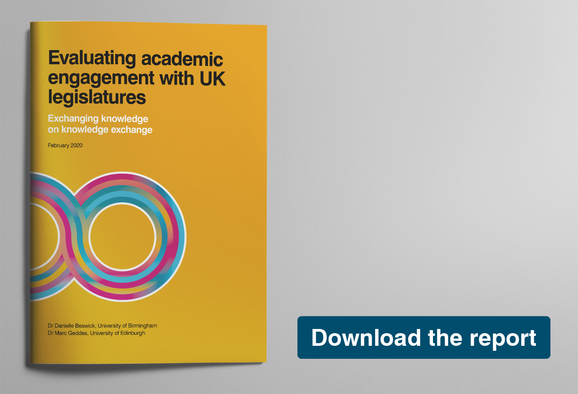Evaluating academic engagement with UK legislatures
Overview
Description
Principal investigators
About the Project
Welcome to the webpage for the Knowledge Exchange project, Evaluating Academic Engagement with UK Legislatures, funded by ESRC Impact Acceleration Accounts, and supported by the UK’s four legislatures and Research England.
This research emerged from consultation with the four UK legislatures in early 2019:
- The Scottish Parliament
- The National Assembly for Wales
- The Northern Ireland Assembly and,
- The UK Parliament.
In recent years, these legislatures have sought to increase and improve the work they do with universities and to encourage academics to increase and improve the contribution of their research to the work of legislatures.
Such work aims to support evidence-informed scrutiny and law-making within each legislature, serving to maximise the public value of academic research findings in the UK. Legislatures’ aims resonate with those of UK universities, which face a combination of increasing pressure and incentives to demonstrate the contribution of publicly-funded research to improving society through, for example, the REF and KEF.
Against this backdrop, this project explores knowledge exchange between the UK’s legislatures and UK universities. It addresses the challenges of defining KE, which are themselves connected to challenges of defining and measuring the effectiveness of KE. The project also identifies a range of KE activities between Higher Education Institutions (HEIs), researchers and universities, and legislatures.
The project findings, published in its final report (see below), suggest that, given variations in practice and purpose of KE across the legislatures, a pragmatic approach to assessing effectiveness would focus on the activities, processes and commitments that underpin a ‘healthy environment for KE’, recognising that the specific components of this will be heavily affected by context and resource constraints. Specifically, the authors identify what an engaged legislature and engaged university looks like:
An engaged legislature
has a clear KE strategy; actively engages with universities and professional associations to disseminate opportunities for engagement; shares expertise on KE with other legislatures; has dedicated staff time allocated to pursuing and improving KE activities; curates a range of activities to engage academic researchers at different career stages, from different institutions, and from different backgrounds; provides appropriate recognition of academic participation in KE activities; and, monitors characteristics of those participating in KE activities.
An engaged university
permits and supports fellowships with legislatures; has staff who are committee advisers; allocates dedicated staff time within workload models or other arrangements to facilitate KE; has staff who submit evidence to legislatures and participate in committee hearings; recognises and supports KE in its own right, not solely as a way to achieve impact; has dedicated internal funding opportunities for KE; hosts inward secondments and supports outward secondments; appoints officials from legislatures to steering groups and/or advisory boards; co-authors publications with legislature staff; recognises KE in workload models and in criteria for promotion; and, submits funding bids which include legislative staff as partners.
To achieve a healthy environment for KE to take place, the authors suggest a number of recommendations in its final report – relevant to both legislatures and HEIs.
In addition to the main report, Dr Beswick and Dr Geddes have published the following individual reports for each legislature, with specific recommendations for each:
- The Welsh Parliament: in English and in Welsh
- The Scottish Parliament
- The Northern Ireland Assembly
- The UK Parliament
Contact
For further information about the project, please contact:

University of Edinburgh

University of Birmingham
Other outputs
In addition to our main report, please find further material for academics and policy-makers:
- Blog summarising our findings for the Universities Policy Engagement Network.
- Blog for Transforming Evidence on how universities can improve parliamentary engagement.
- Article for ResearchProfessional News, summarising the key findings from our research for the HE community.
- Our report has informed the UK legislatures' briefing note, Knowledge Exchange and Legislatures.
Note: This list will be periodically updated.
